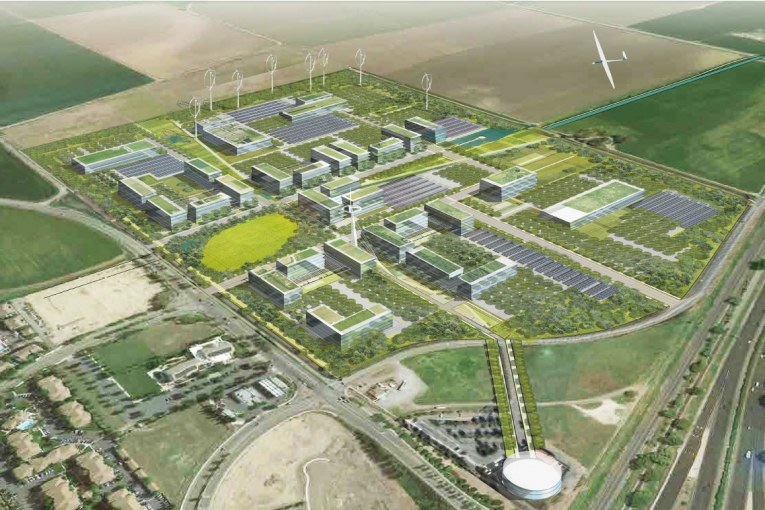

Last night the Davis City Council voted to grant an extension to the comment period for the Mace Ranch Innovation Center EIR. While their stated purpose is to allow the public to review the massive 4000-page environmental review documents associated with the project, the effect will most likely be to push off the vote from June 2016 to November 2016.
While there are undoubtedly those who lament the delay, I believe that the delay is not the worst possible outcome. The delay allows a more full discussion about the need for this project. And while there are those who will point out that we have had discussions on this since 2010 – and certainly long before that, and we have been discussing these matters since spring 2013, with Mace 391 – those were somewhat limited discussions, and a lot more people are now engaged.
Tonight the Vanguard will host one of those discussions. Tonight’s program at the UC Davis Conference Center in a way is a pre-discussion. For a moment, let us forget about the need for commercial space, innovation parks, and other needs for economic development, and let us have a much more basic discussion. Tonight we will discuss the basics of economic development and how the community benefits from entrepreneurs, startups and tech transfer.
Economic development in Davis is going to look different from economic development in other communities. We are not going to lay out a bunch of peripheral shopping centers on our farmland and hope to generate tax revenue. Instead, we will rely on our assets – the biggest of which is our proximity to a world-class university and the plethora of highly-educated people who work at the university, attend the university and live in our community.
The knowledge economy is the use of knowledge and, in particular, “knowledge-based technology” to help transform human knowledge to technology and help transfer knowledge arising from university research to the market through technology transfer.
Technology transfer is a process of transferring skills, knowledge, technologies – much of which were developed in the lab by researchers at the university – to the private sector in the form of products and skills. Entrepreneurs are those individuals who organize these potential emerging technologies into a business, taking on financial risk in order to do so. And a startup is that newly-established business.
Before I think the public can be sold on the need to approve an innovation or tech park, they need to have an understanding of how the community benefits from entrepreneurs, startups and tech transfer.
That task falls to our panel. We have representatives and key people from each step along the way. Our panelists include: Jenna Makus, Associate Director for the UC Davis Institute for Innovation and Entrepreneurship; Scott Ragsdale, General Manager, Davis Roots; Lonnie Bookbinder, Davis Angels Network; and Tim Keller, founder of VinPerfect & CEO of Area 52.
Jenna Makus is the associated director of Child Family Institute for Innovation and Entrepreneurship. She oversees the operations, communications and program planning at the institute.
The institute “integrates science and business for social benefit. We bring together researchers in science and engineering with faculty, MBA students, UC Davis undergraduates, experienced entrepreneurs, investors and corporate leaders to support technology transfer and commercialization activities.”
Scott Ragsdale will talk about Davis Roots, which acts an incubator which helps people interested in forming a startup take their first steps. Then we have Lonnie Bookbinder, who has helped to organize the Davis Angels Network, which is looking to create an angel fund to help startups.
Both Davis Roots and Davis Angels Network have been created to help startups do some of the toughest things – get off their feet.
Finally, Tim Keller is an entrepreneur. He was a co-founder of VinPerfect, and now tonight he is going to announce the launch of Area 52.
Part of the reason we have chosen this topic is that the community has focused for so long about the land use issues regarding innovation parks, that it is has not had enough in-depth discussions about the underlying benefits to the community that economic development has.
In order to answer why we need space for economic development, we need to understand the core benefits to the community – and in this, I do not mean just tax revenue which could come down the line.
The university is pumping billions into research and technology, and it is important to understand how this community is benefiting from that research and technology.
This is an important discussion about the future of our community. We must understand the benefits of such enterprise before we make critical land use decisions that will shape the face of this community.
I hope everyone can join us tonight at 6 pm at the UC Davis Conference Center. I have been told that parking at that hour is free. However, the event is not free. The $50 cost will hopefully help fund the Davis Vanguard for its operational expenses into the fall. Tickets are available at the door – join us for a great discussion, wine and appetizers.
If you can’t make it – but want to help – log on here.
—David M. Greenwald reporting

this is a good point – to date i have seen arguments on both sides – land use issues – too many acres, blowing out the borders, paving farmland, nature of the city versus economic/ fiscal reasons. but let’s say we never build an innovation park and never get the tax revenue, is there a benefit to the city? does this tech transfer activity benefit davis?